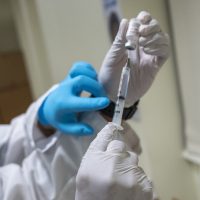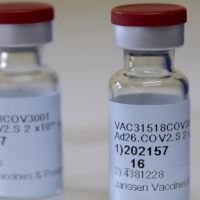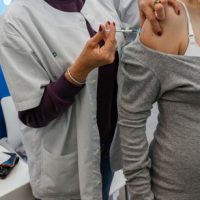No vaccine or medical product is 100% safe, but the safety of vaccines is ensured via rigorous testing in clinical trials prior to authorization or approval, followed by continued safety monitoring once the vaccine is rolled out to the public to detect potential rare side effects. In addition, the Food and Drug Administration inspects vaccine production facilities and reviews manufacturing protocols to make sure vaccine doses are of high-quality and free of contaminants.
Misconception: Vaccination
How safe are the COVID-19 vaccines?
More than half a billion doses of COVID-19 vaccines have now been administered in the U.S. and only a few, very rare, safety concerns have emerged. The vast majority of people experience only minor, temporary side effects such as pain at the injection site, fatigue, headache, or muscle pain — or no side effects at all. As the Centers for Disease Control and Prevention has said, these vaccines “have undergone and will continue to undergo the most intensive safety monitoring in U.S.
How effective are the COVID-19 vaccines?
All of the authorized and approved vaccines are effective at preventing severe COVID-19.
Against earlier forms of the coronavirus, the vaccines were highly effective at preventing symptomatic illness. For example, clinical trials for the Pfizer/BioNTech and Moderna mRNA vaccines and the protein-based Novavax vaccine found each reduced the risk of getting sick by more than 90%.
Subsequent studies have demonstrated that the vaccines are effective under real-world conditions.
How were the COVID-19 vaccines tested?
The authorized or approved vaccines were initially tested in animals and early phase clinical trials, in which scientists evaluated different doses, checked for the expected immune responses and monitored for potential safety issues. To find out whether the shots prevent disease and are safe, the vaccines that passed the first set of tests were then evaluated in phase 3 trials.
The Moderna and Novavax phase 3 trials each included about 30,000 volunteers,
Pace of U.S. Vaccinations vs. the World
A Guide to Johnson & Johnson’s COVID-19 Vaccine
No Evidence Vaccines Impact Fertility
Q: Do the COVID-19 vaccines cause infertility?
A: There’s no evidence that approved vaccines cause fertility loss. Although clinical trials did not study the issue, loss of fertility has not been reported among thousands of trial participants nor confirmed as an adverse event among millions who have been vaccinated.
How long will a person be protected if vaccinated against COVID-19?
It’s not known exactly how long vaccination lasts, particularly against the omicron variant. But studies of previous variants have suggested that COVID-19 vaccination protects against infection or mild disease for several months, while protection against more serious illness is longer-lasting, on the order of six months or more.
A systematic review of studies conducted prior to omicron, for example, found that for the four main COVID-19 vaccines used worldwide,
How does community immunity apply to COVID-19?
Community immunity, often referred to as herd immunity, refers to a situation in which enough of a population is immune to an infectious disease, either through vaccination or prior infection, to largely stop transmission of the disease and indirectly protect those who aren’t immune. The more contagious the disease, the higher proportion of people need to have immunity to get community immunity.
This classical definition applies to diseases such as measles,
Could a COVID-19 vaccine become mandatory?
Some employers have required their employees to be vaccinated, or undergo regular testing, for COVID-19. The U.S. Equal Employment Opportunity Commission has said that employers aren’t prevented from having a mandatory vaccination policy for COVID-19 for employees who are physically in the workplace, as long as employers comply with federal laws stipulating that reasonable accommodations should be made for workers who cannot be immunized because of a disability or religious reason.
President Joe Biden also signed executive orders in September 2021 to require all federal workers and contractors who do business with the federal government to be vaccinated.


